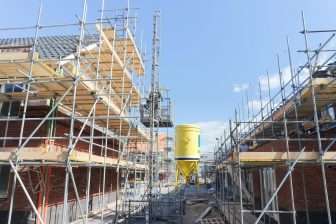 The UK does not have enough construction workers to build the 1.5 million homes the government has promised, industry leaders have warned.
The UK does not have enough construction workers to build the 1.5 million homes the government has promised, industry leaders have warned.
Labour’s existing housebuilding plan during this parliament is not achievable because of a severe skills shortage, an ageing workforce and Brexit, the head of Britain’s largest housebuilding company has said.
The government outlined last week how it would achieve this goal. The proposals within the revised national planning policy framework (NPPF) include individual targets for each planning authority and new rules that will allow for housebuilding on poorer quality green-belt land.
The current workforce is estimated to be 2.67 million, according to the Construction Industry Training Board (CITB).
But for every 10,000 new homes to be built, the sector needs about 30,000 new recruits across 12 trades, according to the HBF, the trade body for the house building industry in England and Wales.
Based on the government’s plans, the estimated number of new workers required for some common trades, for example, would be:
-
20,000 bricklayers
-
2,400 plumbers
-
8,000 carpenters
-
3,200 plasterers
-
20,000 groundworkers
-
1,200 tilers
-
2,400 electricians
-
2,400 roofers
-
480 engineers
“They’re challenging targets. I think we have to recognise that this is a national crisis,” Barratt Redrow chief executive, David Thomas, said.
He told the BBC the government would have to “revolutionise the market, revolutionise planning, revolutionise methods of production” for their target to be met.
“They’re challenging targets, I think we have to recognise that this is a national crisis,” Thomas added.
The Home Builders Federation (HBF) accepted said the UK “does not have a sufficient talent pipeline” of builders to employ. It cited several recruitment constraints, including a poor perception and lack of training within schools, not enough apprenticeships and the costs of taking on apprentices.
The industry body admitted the sector itself had not “attracted” enough new recruits in recent years.
The government confirmed there was a “dire shortage” of construction workers but said it was “taking steps to rectify” the problem.
Thomas said recruitment had not been helped by a drive in past decades to encourage young people into further education rather than trades.
“If you went back to the 60s and 70s, I think parents, teachers, and the government were very happy with the idea that people became trades – electricians, plumbers, bricklayers,” he said.
The average rates of pay for these jobs “are high” but the issue was “more about availability of labour with skills, he said.


Is it a real shortage of tradesman or a shortage of low paid workers from overseas.
You must be logged in to like or dislike this comments.
Click to login
Don't have an account? Click here to register
In the past it was always the less academic who trained for a trade. Today the only way to train is to attend your local college but you must have English and maths GCSE. Our local college is around 15 miles away and parents have to buy a bus pass for their children to attend. The pass costs over £600 per year for just 2 days at college. Not so long ago this was free for under 18’s.
You must be logged in to like or dislike this comments.
Click to login
Don't have an account? Click here to register